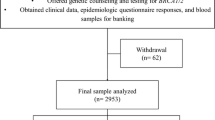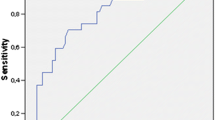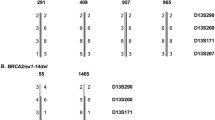Abstract
Aims
The majority of hereditary breast and ovarian cancers are associated with highly penetrant mutations in two genes: BRCA 1 and 2. Our aim was to investigate the prevalence and types of BRCA mutations in patients from the West of Ireland.
Methods
A retrospective cohort study was undertaken that included all patients from the counties, Mayo, Sligo, Galway, Roscommon, and Clare, who were referred to the National Centre for Medical Genetics (NCMG) for testing for mutations in BRCA 1 or 2 between 2000 and 2010. Data including age, symptoms, family history, Manchester score, and test results were recorded and analysed using SPSS.
Results
The NCMG received 380 referrals from the Western seaboard, including 148 for diagnostic testing and 232 for predictive evaluation. Sixty-five patients did not attend for assessment. Two hundred and fifty-six patients fulfilled criteria for genetic counselling, which was accepted by 184, of whom 127 proceeded to testing. Predictive tests were more often declined than diagnostic [41 (46 %) vs. 16 (17 %)]. Ten mutations in BRCA 1 were identified in 20 patients (15 families), including Exon 1–23del (3 families); Exon 14–20del (2 families) and E143X (2 families). Six mutations in BRCA 2 were identified in 15 patients (12 families) including 8525delC (n = 2 families) and 8205-1G>C (n = 3 families). Patients with positive results had significantly higher Manchester scores than those with negative tests [median 25.5 (12–48) vs. 20 (8–37), p = 0.042, Mann–Whitney U test].
Conclusion
To identify patients with highly penetrant variants, referrals should be made with strict adherence to guidelines. Counselling should be individualised to counteract intrinsic psychological barriers to testing.

Similar content being viewed by others
References
Easton DF (1999) How many more breast cancer predisposition genes are there? Breast Cancer Res 1(1):14–17
Anglian Breast Cancer Study Group (2000) Prevalence and penetrance of BRCA 1 and BRCA 2 mutations in a population-based series of breast cancer cases. Br J Cancer 83(10):1301–1308
Antoniou AC, Pharoah PDP, McMullan G et al (2002) A comprehensive model for familial breast cancer incorporating BRCA 1, BRCA 2 and other genes. Br J Cancer 86(1):76–83
O’Donovan PJ, Livingston DM (2010) BRCA 1 and BRCA 2: breast/ovarian cancer susceptibility gene products and participants in DNA double-strand break repair. Carcinogenesis 31(6):961–967
Janavičius R (2010) Founder BRCA 1/2 mutations in the Europe: implications for hereditary breast-ovarian cancer prevention and control. EPMA J 1(3):397–412
Mann GJ, Thorne H, Balleine RL et al (2006) Analysis of cancer risk and BRCA 1 and BRCA 2 mutation prevalence in the kConFab familial breast cancer resource. Breast Cancer Res 8(1):R12
Risch HA, McLaughlin JR, Cole DEC et al (2006) Population BRCA 1 and BRCA 2 mutation frequencies and cancer penetrance: a kin-cohort study in Ontario, Canada. J Natl Cancer Inst 98(23):1694–1706
Ford D, Easton DF, Bishop DT et al (1994) Risks of cancer in BRCA 1-mutation carriers. Breast cancer linkage consortium. Lancet 343(8899):692–695
Ford D, Easton DF, Stratton M et al (1998) Genetic heterogeneity and penetrance analysis of the BRCA 1 and BRCA 2 genes in breast cancer families. Am J Hum Genet 62(3):676–689
Antoniou A, Pharoah PDP, Narod S et al (2003) Average risks of breast and ovarian cancer associated with BRCA 1 or BRCA 2 mutations detected in case series unselected for family history: a combined analysis of 22 studies. Am J Hum Genet 72(5):1117–1130
Easton DF, Matthews FE, Ford D et al (1996) Cancer mortality in relatives of women with ovarian cancer: the OPCS study. Int J Cancer 65(3):284–294
Peto J, Easton DF, Matthews FE et al (1996) Cancer mortality in relatives of women with breast cancer: the OPCS study. Int J Cancer 65(3):275–283
Antoniou A, Pharoah PDP, Narod S et al (2003) Average risks of breast and ovarian cancer associated with BRCA 1 or BRCA 2 mutations detected in case series unselected for family history: a combined analysis of 22 studies. Am J Hum Genet 72(5):1117–1130
Friedenson B (2005) BRCA 1 and BRCA 2 pathways and the risk of cancers other than breast or ovarian. Med Gen Med 7(2):60
McEvoy B, Richards M, Forster P et al (2004) The longue dureé of genetic ancestry: multiple genetic marker systems and celtic origins on the Atlantic facade of Europe. Am J Hum Genet 75(4):693–702
Wilson JF, Weiss DA, Richards M et al (2001) Genetic evidence for different male and female roles during cultural transitions in the British Isles. Proc Natl Acad Sci USA 98(9):5078–5083
Hill EW, Jobling MA, Bradley DG (2000) Y-chromosome variation and Irish origins. Nature 404(6776):351–352
O’Dushlaine CT, Dolan C, Weale ME et al (2008) An assessment of the Irish population for large-scale genetic mapping studies involving epilepsy and other complex diseases. Eur J Hum Genet 16(2):176–183
Abeliovich D, Kaduri L, Lerer I et al (1997) The founder mutations 185delAG and 5382insC in BRCA 1 and 6174delT in BRCA 2 appear in 60% of ovarian cancer and 30% of early-onset breast cancer patients among Ashkenazi women. Am J Hum Genet 60(3):505–514
Oddoux C, Struewing JP, Clayton CM et al (1996) The carrier frequency of the BRCA 2 6174delT mutation among Ashkenazi Jewish individuals is approximately 1%. Nat Genet 14(2):188–190
Struewing JP, Hartge P, Wacholder S et al (1997) The risk of cancer associated with specific mutations of BRCA 1 and BRCA 2 among Ashkenazi Jews. N Engl J Med 336(20):1401–1408
WHO (2004) The molecular genetic epidemiology of cystic fibrosis: report of a joint meeting of World Health Organisation; European Cystic Fibrosis Thematic Network; International Cystic Fibrosis (Mucoviscidosis) Association; European Cystic Fibrosis Society
Brédart A, Autier P, Audisio RA et al (1998) Psycho-social aspects of breast cancer susceptibility testing: a literature review. Eur J Cancer Care 7(3):174–180
Lynch HT, Snyder C, Lynch JF et al (2006) Patient responses to the disclosure of BRCA mutation tests in hereditary breast-ovarian cancer families. Cancer Genet Cytogenet 165(2):91–97
Douglas HA, Hamilton RJ, Grubs RE (2009) The effect of BRCA gene testing on family relationships: a thematic analysis of qualitative interviews. J Genet Couns 18(5):418–435
Kwon JS, Gutierrez-Barrera AM, Young D et al (2010) Expanding the criteria for BRCA mutation testing in breast cancer survivors. J Clin Oncol 28(27):4214–4220
Balmaña J, Díez O, Rubio IT et al (2011) BRCA in breast cancer: ESMO clinical practice guidelines. Ann Oncol 22(SUPPL. 6):vi31–vi34
Robson ME, Storm CD, Weitzel J et al (2010) American society of clinical oncology policy statement update: genetic and genomic testing for cancer susceptibility. J Clin Oncol 28(5):893–901
Evans DGR, Eccles DM, Rahman N et al (2004) A new scoring system for the chances of identifying a BRCA 1/2 mutation outperforms existing models including BRCAPRO. J Med Genet 41(6):474–480
NICE, NICE guideline CG041 (2006) Familial breast cancer. The classification and care of women at risk of familial breast cancer in primary, secondary and tertiary care. NICE, London
McDevitt T, Higgins M, Crowley A et al (2010) Spectrum and incidence of BRCA 1 and BRCA 2 mutations in the Republic of Ireland—an audit (abstract). Ulster Med J 79(1):33–42
Altshuler DM, Gibbs RA, Peltonen L et al (2010) Integrating common and rare genetic variation in diverse human populations. Nature 467(7311):52–58
National Human Genome Research Institute, BRCA1 Mutation Database (2011) Available from: http://research.nhgri.nih.gov/projects/bic/index.shtml
Ticha I, Kleibl Z, Stribrna J et al (2010) Screening for genomic rearrangements in BRCA 1 and BRCA 2 genes in Czech high-risk breast/ovarian cancer patients: high proportion of population specific alterations in BRCA 1 gene. Breast Cancer Res Treat 124(2):337–347
Palma MD, Domchek SM, Stopfer J et al (2008) The relative contribution of point mutations and genomic rearrangements in BRCA 1 and BRCA 2 in high-risk breast cancer families. Cancer Res 68(17):7006–7014
Devilee P, Hogervorst F (2002) Summary of published and unpublished BRCA1 mutations in the Netherlands and Belgium. Available from: http://www.humgen.nl/lab-devilee/Lab/b1nlmuts.htm
Foster C, Evans DGR, Eeles R et al (2004) Non-uptake of predictive genetic testing for BRCA 1/2 among relatives of known carriers: attributes, cancer worry, and barriers to testing in a multicenter clinical cohort. Genet Testing 8(1):23–29
Meiser B (2005) Psychological impact of genetic testing for cancer susceptibility: an update of the literature. Psychooncology 14(12):1060–1074
Carroll JC, Heisey RE, Warner E et al (1999) Hereditary breast cancer: psychosocial issues and family physicians’ role. Can Fam Physician 45:126–132
Thompson HS, Valdimarsdottir HB, Duteau-Buck C et al (2002) Psychosocial predictors of BRCA counselling and testing decisions among urban African-American women. Cancer Epidemiol Biomark Prev 11(12):1579–1585
van Oostrom I, Meijers-Heijboer H, Duivenvoorden HJ et al (2007) A prospective study of the impact of genetic susceptibility testing for BRCA 1/2 or HNPCC on family relationships. Psychooncology 16(4):320–328
Antoniou AC, Easton DF (2006) Models of genetic susceptibility to breast cancer. Oncogene 25(43):5898–5905
McInerney NM, Miller N, Rowan A et al (2010) Evaluation of variants in the CHEK2, BRIP1 and PALB2 genes in an Irish breast cancer cohort. Breast Cancer Res Treat 121(1):203–210
Smith P, McGuffog L, Easton DF et al (2006) A genome wide linkage search for breast cancer susceptibility genes. Genes Chromosom Cancer 45(7):646–655
Pharoah PDP, Antoniou A, Bobrow M et al (2002) Polygenic susceptibility to breast cancer and implications for prevention. Nat Genet 31(1):33–36
Conflict of interest
None.
Author information
Authors and Affiliations
Corresponding author
Rights and permissions
About this article
Cite this article
McVeigh, T.P., Irwin, R., Cody, N. et al. Familial breast cancer genetic testing in the West of Ireland. Ir J Med Sci 183, 199–206 (2014). https://doi.org/10.1007/s11845-013-0990-2
Received:
Accepted:
Published:
Issue Date:
DOI: https://doi.org/10.1007/s11845-013-0990-2




